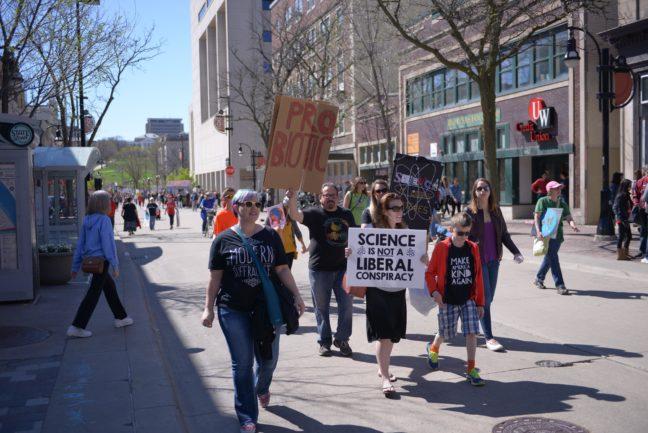At the end of January, Americans faced a polar vortex. Madison was hit with minus 26 degree weather, making Jan. 30 the coldest day in nearly 100 years. When brutal winter weather rears its head, so does the classic phrase: “If global warming is real, why is it so cold outside?”
More often than not, people wrongly use the phrase “global warming” in reference to climate change. There tends to be confusion around these two phrases, as scientists’ terminology has changed over the decades. While climate change and global warming are used interchangeably, there is a distinction to be made and misconceptions to be cleared up.
“Global warming refers to the rise in global temperatures due mainly to the increasing concentrations of greenhouse gases in the atmosphere,” the U.S. Geological Survey said. “Climate change refers to the increasing changes in the measures of climate over a long period of time — including precipitation, temperature and wind patterns.”
In short, global warming is an aspect of climate change. Climate change is multifaceted and affects animal species, the polar region, forests, bodies of water and us. Those who generalize the world’s changing environment as “global warming” are mistaken and risk the chance of spreading misinformation.
For an example of someone who doesn’t fully know the difference between climate change and global warming, look no further than President Donald Trump. In several tweets from 2015, he mocked the idea of global warming.
“Record low temperatures and massive amounts of snow. Where the hell is GLOBAL WARMING?” Trump tweeted.
And it seems he hasn’t learned — just this month, Trump questioned the existence of global warming again.
In fact, according to NASA and NOAA, 2018 ranked as the 4th hottest year on record, with the last five years all falling in the top five hottest years on record.
“2018 is consistent with the long term warming trend,” Zeke Hausfather, a research scientist with Berkeley Earth, said. “It’s significantly warmer than any of the years before 2015. There’s still this big bump up after 2014, and 2015, 2016, 2017 and 2018 are all in a class of their own.”
But overuse of the term “global warming” without acknowledgment of the broader issue — climate change — allows climate change skeptics space to easily dismiss the problem when the temperature plummets below zero.
Even though the planet is getting warmer, cold weather still comes into play regionally. Our weather is a result of Earth’s tilted axis as it revolves around the sun. During winter, the northern hemisphere is tilted away from the sun, making temperatures lower. Climate change cannot affect the earth’s tilt, meaning that winters will most likely stay cold. What climate change can impact, however, is the extremity of the weather. Increased ocean evaporation leads to heavier rain and snow falls, and therefore life-threatening flooding and tornadoes.
If people continue to dismiss global warming simply because it’s not warm outside, they will believe that no action needs to be taken. They will not only ignore legislation and dismiss news sources, people might refuse to do simple tasks to prevent the impending damage that climate change will inevitably cause.
This ignorance is not quite the same as not watching the news and not being affected by overseas crises. If people ignore climate change, chances are, its urgency will only escalate. United Nations International Children’s Emergency Fund projects that by 2040, 1 in 4 children worldwide will live in areas with extremely limited water resources, resulting in higher chances of disease, malnutrition and death.
While it’s a bit dramatic to immediately assume misusing the phrase global warming will create devastating world effects, educating the public and clearing up misconceptions is a vital step in preserving our world. A simple Google search can clear the air for many, hopefully urging them to literally clear the air.
It often feels like there’s not much we can do to prevent the impending doom on our planet. The first step is education. People need to know the real, scientific facts of climate change and not just assume that subzero temperatures mean there is no problem at hand.
Keagan Schlosser (kschlosser2@wisc.edu) is a freshman majoring in communications.


